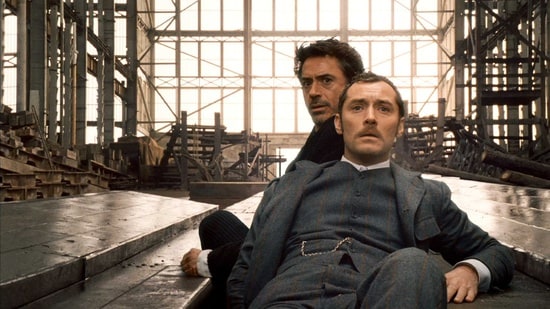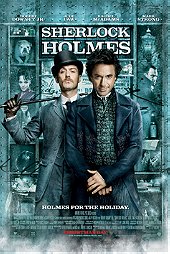Born from the mind of Sir Arthur Conan Doyle, Sherlock Holmes has been imbedded in the public consciousness for in excess of a century now through countless short stories, books, films, and pop culture interpretations. It's an indubitably impressive run, and has caused the character to become one of the most recognisable literary figures in history. Considering the amount of famous film franchises which have been rebooted over recent years (Star Trek, James Bond, etc), it comes as no surprise to learn of the birth of a new Sherlock Holmes film series specifically tailored for a new generation. British filmmaker Guy Ritchie combines his kinetic directorial methods with the limitless charms of Robert Downey Jr. and Jude Law to produce 2009's Sherlock Holmes. This newest version of the character won't likely please purists, but it isn't made for them - similar to Batman Begins and Star Trek, the timeless fictional characters are fashioned to produce a breakneck thriller intended to electrify modern audiences and widen the appeal. That's not to say Ritchie's version depicts Holmes as a straight-up action hero - in spite of the action being played up to satisfy contemporary viewers who'd find a more subdued portrayal too dull, the film is more intelligent than expected, and this is by no means hackwork.

As Sherlock Holmes begins, the titular character (Downey Jr.) and his faithful sidekick Dr. Watson (Law) apprehend serial killer Lord Blackwood (Strong) before he can claim his sixth victim via a dark arts ceremony. Prior to Blackwood's hanging, he warns Holmes that the mayhem and murder won't cease with his execution. Inevitably, this statement rings true. When Blackwood appears to have risen from the grave, the case takes a macabre turn. Complicating the situation is Irene Adler (McAdams), Holmes' slippery former flame, who has returned to London but whose motivations are vague and highly suspicious.
Guy Ritchie mixes the grittiness and brawling of Snatch with buddy cop elements (think Lethal Weapon) and the cheekiness of an Indiana Jones movie to form his Sherlock Holmes. The team of screenwriters (Michael Robert Johnson, Anthony Peckman and Simon Kinberg) keep their tale within the Victorian-era setting in London, and liberally draw from the Holmes canon as familiar characters are plucked from various tales and mixed into this unique stew which relies as much on the detective's physical abilities as it does his deductive capabilities. Fortunately, a couple of combat sequences are skilfully transformed into an intellectual exercise by decelerating the action and allowing Holmes to work out a carefully calculated series of actions to disarm his opponent. Thus, while the execution is purely physical, the violence works in conjunction with (rather than in opposition to) his intellect, not to mention it demonstrates that Holmes is always 100 steps ahead of his enemies.

Dipping into chemistry, pentagrams and early forms of electricity, the plot of Sherlock Holmes is all over the place, and it's so convoluted that one will likely have difficult wrapping their head around it all. This is, of course, due to Ritchie's hyperactive style - the director has crafted an action-adventure all about whooshing and head-banging; leaving little space between each jackhammer sequence to savour the meaning of Holmes' words. Sherlock Holmes literally plays out as if the entire film is on fast-forward. Even during the expositional scenes, there's a distinct lack of substance. On top of this, the plot is not exactly interesting - it feels like the work of Dan Brown (it's almost a doppelganger of Angels & Demons). Granted, the film remains pleasant fun, but it's too disappointingly average, disposable, and simply blah.
In portraying the legendary Sherlock Holmes, Robert Downey Jr. adds his name to an extensive list of actors, including such luminaries as Peter O'Toole, John Barrymore, Peter Cushing and the beloved Basil Rathbone. It may be tempting to perceive Downey's portrayal and Ritchie's amped-up aesthetic approach to the material as mere revisionism for the ADD generation, but it's closer in spirit and tone to Doyle's original character, who is more of a self-imposed social outcast than the distinguished, academic figure to which audiences have grown accustomed. Robert Downey Jr. could not be better casting - it's an articulation of genius that makes Sherlock Holmes such an interesting film despite the myriad flaws. His British accent is utterly convincing. Better, Downey shares pointed chemistry with Jude Law. The role of Dr. Watson was a very smart choice for Law; providing viewers with the opportunity to truly appreciate the actor's screen skills. Law exudes charm and verve as Dr. Watson; offering a more muscular portrait of the character and providing a welcome straight-man for whenever Holmes' eccentricities cross the line.

Sherlock Holmes is further marred by the inclusion of one of the dullest villains in the Holmes canon: Lord Blackwood (played by Mark Strong) who sneers a lot and aspires to take over the world in typical Blofield fashion. Strong is an excellent actor, but the character is neither broad nor menacing enough for him to sink his teeth into, and he's therefore relegated to scowling for the majority of the movie. Rachel McAdams, meanwhile, looks visibly out of her league alongside the impeccable Downey Jr. and Law.
Guy Ritchie, who hasn't had a true hit since Snatch and has been unable to bring anything new to the table since the early days of the Blair government, had long seemed a spent force. But Sherlock Holmes is a good career move. His fingerprints are all over the movie in terms of visual whiplash, but Ritchie was not among those who wrote the script, and therefore the film has not been created as Snatch in a Victorian-era setting (Tarantino should pay attention, since his Inglourious Basterds was virtually Pulp Fiction in a World War II setting). Here, Ritchie acquits himself particularly well for several exhilarating set-pieces; particularly a breathless foot-chase which ends with the destruction of an unfinished ocean liner. On a technical level, 19th Century London as it enters the modern age has been vividly and dynamically recreated, and composer Hans Zimmer delivers an enthralling score.

Ultimately, as films like X-Men achieved with the reintroduction of long-established characters to a new generation, Sherlock Holmes is more successful as a set-up to its sequels rather than a satisfying standalone story. When freed of the origin-story constraints, Brian Singer truly took off with X-Men 2, and so too should Ritchie when it comes time to create a sequel. The reason Sherlock Holmes fails as often as it succeeds is because it merely offers interesting characters in search of a worthwhile story.
6.1/10
 Login
Login